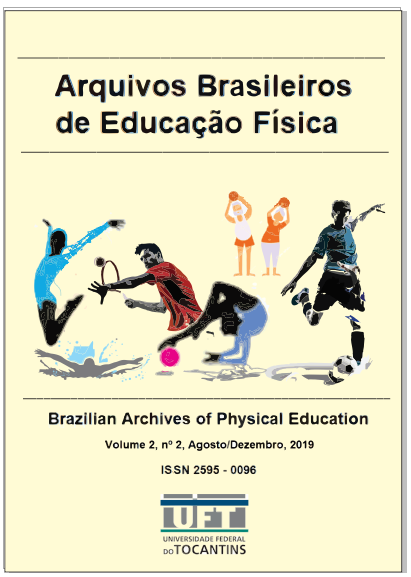DESPORTO MILITAR EM PORTUGAL: Contributos para uma nova visão estratégica a partir da perceção dos atletas
DOI:
https://doi.org/10.20873/abef.2595-0096.v2n2p43.2019Keywords:
esportes, militares, atletasAbstract
Abstract: This document attends to address Military Sports in Portugal and to give this structure and also to the Armed Forces and Security Forces relevant and informative content about the sports practice of some of its subordinates. Military Sports is the set of various sports activities practiced essentially by the Armed Forces (Army, Air Force and Navy) and the Security Forces (Republican National Guard and Public Security Police). This sports structure, while safeguarding the specific sports activities of the environment, also seeks to dinamize and articulate them with the sports system of society, encompassing other so-called civilian sports activities. Objective: This study looks to identify the current situation of Military Sports, to know the opinion of is athletes in relation to their sports practice and also to make an overall analysis of the Military Sports subsystem. Methods: For this study a documentary and cross - sectional research was done, qualitative and quantitative methods were used and data analysis was done with a view to creating future strategies that contribute to the knowledge and development of Military Sports at a national level. In order to collect data, contacts were established with the other Military Sports officials in Portugal, and a questionnaire survey was conducted and disseminated, which was applied face-to-face and online. Results: The number of Military Sports practitioners in Portugal has declined year after year in some of the institutions referred in this study. The military athletes who were interviewed did not show much satisfaction with the military sports subsystem, namely the conditions offered to them and the numerous difficulties in sports practice. It is estimated that Military Sports can contribute to the development of sport and national society through the promotion of military athletes and other structures. Conclusion: Opportunities should be created for greater openness to other Military Sports stakeholders in order to optimize and maximize their potential. There is clearly a need to improve the strategy for the dissemination of Military Sports in order to adapt the sport offer in this environment.
References
Decreto Regulamentar n.° 31/97 de 6 de setembro. Comissão de Educação Física e Desporto Militar. Disponível em: https://dre.pt/application/conteudo/642909
Frazão, P. (2015). DESPORTO MILITAR EM PORTUGAL: Contributos para uma nova visão estratégica. Mestrado em Direção e Gestão Desportiva, Universidade de Évora, Portugal.
Lei Orgânica n.º 2/2009 de 22 de julho. Regulamento de Disciplina Militar. Disponível em: http://www.emgfa.pt/documentos/mv7njr0kypt8.pdf
Pedro, J. (2004). Gestão da Educação Física Militar: Sua Importância para o Militar do Exército. Trabalho Individual de Longa Duração do IAEM 2002-2004. Lisboa: IAEM
Regulamento das Competições Desportivas Militares Nacionais. Portaria n.° 260/98 (2.ª série), de 17 de Fevereiro de 1998, dos Ministérios da Defesa Nacional e da Administração Interna, publicada no DR, 2.ª série, n.º 53, de 04.03.98. Disponível em: http://www.idesporto.pt/ficheiros/file/Portaria_260_1998.pdf
Downloads
Published
How to Cite
Issue
Section
License
Proposal for Copyright Notice Creative Commons
1. Policy Proposal to Open Access Journals
Authors who publish with this journal agree to the following terms:
A. Authors retain copyright and grant the journal right of first publication with the work simultaneously licensed under the Creative Commons Attribution License that allows sharing the work with recognition of its initial publication in this journal.
B. Authors are able to take on additional contracts separately, non-exclusive distribution of the version of the paper published in this journal (ex .: publish in an institutional repository or as a book), with an acknowledgment of its initial publication in this journal.
C. Authors are permitted and encouraged to post their work online (eg .: in institutional repositories or on their website) at any point before or during the editorial process, as it can lead to productive exchanges, as well as increase the impact and the citation of published work (See the Effect of Open Access).




